Changing electric guitar strings is not that hard and something you should become comfortable doing on your own. You should change your strings on a regular basis. For example, if you start to see an oily, dirty build-up on your strings then you should probably change your strings. The dirt from your hands and fingers is collected by the strings and will kill your tone.
Active players or professional players may change their strings once a week or more, especially if they are playing in public. Some players change strings just before each show.
A Word About String Gauges
Strings come in a variety of gauges. The gauge of the string tells you the thickness of the strings. The lower the gauge the thinner the strings, higher gauges mean thicker strings. Most manufacturers display the gauge size by the size (diameter) of the high E string (the smallest string). Typical gauges run from .008 to .012.
Different strings are made for electric guitar and acoustic guitar. The most popular electric guitar gauge is .009. Most acoustic guitar players use .010. Novice and intermediate-level guitarists will want to stick with these common gauges.
More experienced guitarists may want to experiment with higher gauges (.011 or .012 and up) because they offer better sustain and tone. Higher gauged strings are harder to play. They feel “heavy” under your fingers and take some getting used to. They’ll also make your fingertips quite tender if you’re not used to them.
Do not use heavy gauge strings until you have had a guitar technician look at your guitar. Using heavy gauge strings may require adjustments that only a qualified technician should perform.
Changing Electric Guitar Strings (Fender Strat Style)
There are thousands of types of guitars and many of them need different methods of changing strings. Use this guide as just an example.
One thing that will help you wind and unwind your strings faster is a little device you’ll find at your music shop:
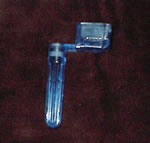
Take your string winder (or if you don’t have one, do it by hand) and
unwind the top string until it comes off the tuning machine. Trash the
old string.
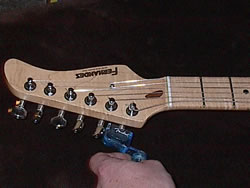
Insert your new string through the bridge or the bottom of the guitar tremelo system:
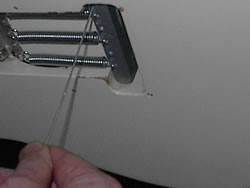
Pull the string out on the other side:
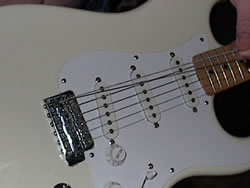
Insert the string into the tuning machine:
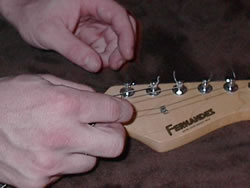
Make sure you line the string up into the nutt:
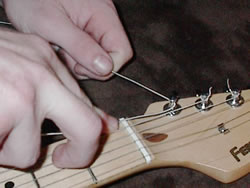
Now take your string winder and wind it up:
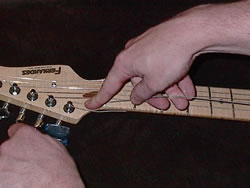
Hold the string with your extra hand as below to keep slack out of the string:
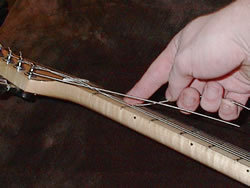
Wind the string up until it doesn’t rattle against the neck, then clip
the access string poking out of the tuning machine:
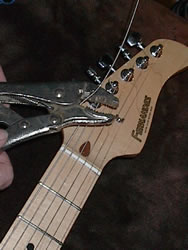
Repeat this procedure for the other 5 strings.